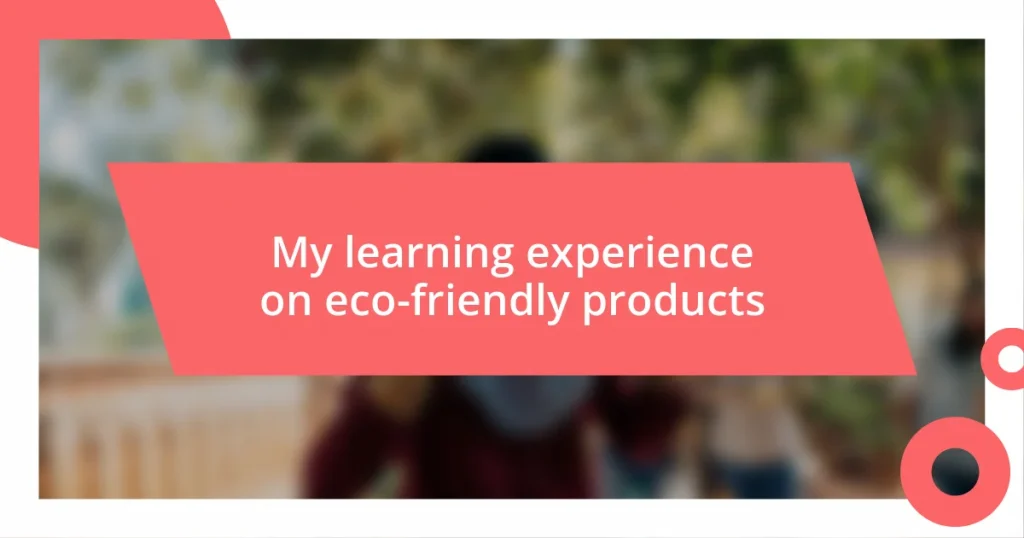Key takeaways:
- Swapping conventional products for eco-friendly alternatives can lead to significant environmental impact and personal satisfaction, highlighting the importance of individual choices in promoting sustainability.
- Eco-friendly products contribute to waste reduction, resource conservation, health benefits, support ethical practices, and offer long-term savings, making them essential for a sustainable lifestyle.
- Evaluating eco-friendly claims requires thorough research into product certifications and ingredient transparency, as many marketing terms can be misleading; supporting local brands can also enhance sustainability efforts.
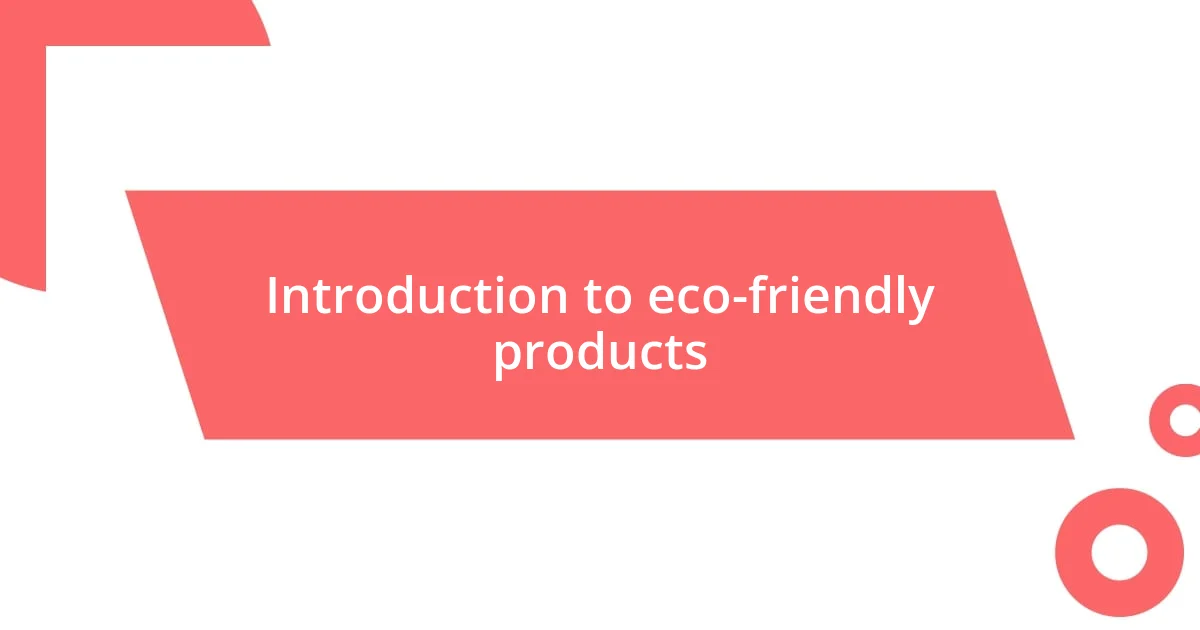
Introduction to eco-friendly products
Eco-friendly products are designed to minimize harm to the environment, often using sustainable materials and processes. I remember the first time I swapped my conventional cleaning supplies for natural alternatives; the fresh scent of vinegar and baking soda felt like a little triumph. It made me wonder, how many simple changes can lead to a bigger impact on our planet?
When I think about eco-friendly products, I reflect on my journey toward a more sustainable lifestyle. Each choice seems small, yet cumulatively, these choices can spark significant change. Don’t you ever ponder how the simple act of selecting biodegradable packaging over plastic can ripple through our ecosystems?
The beauty of eco-friendly products is that they often encourage mindfulness in our consumption habits. I still recall feeling a sense of satisfaction when I purchased my first bamboo toothbrush. It was a small, yet impactful step toward reducing my plastic footprint, and it made me think: what other daily items can I replace with sustainable alternatives?
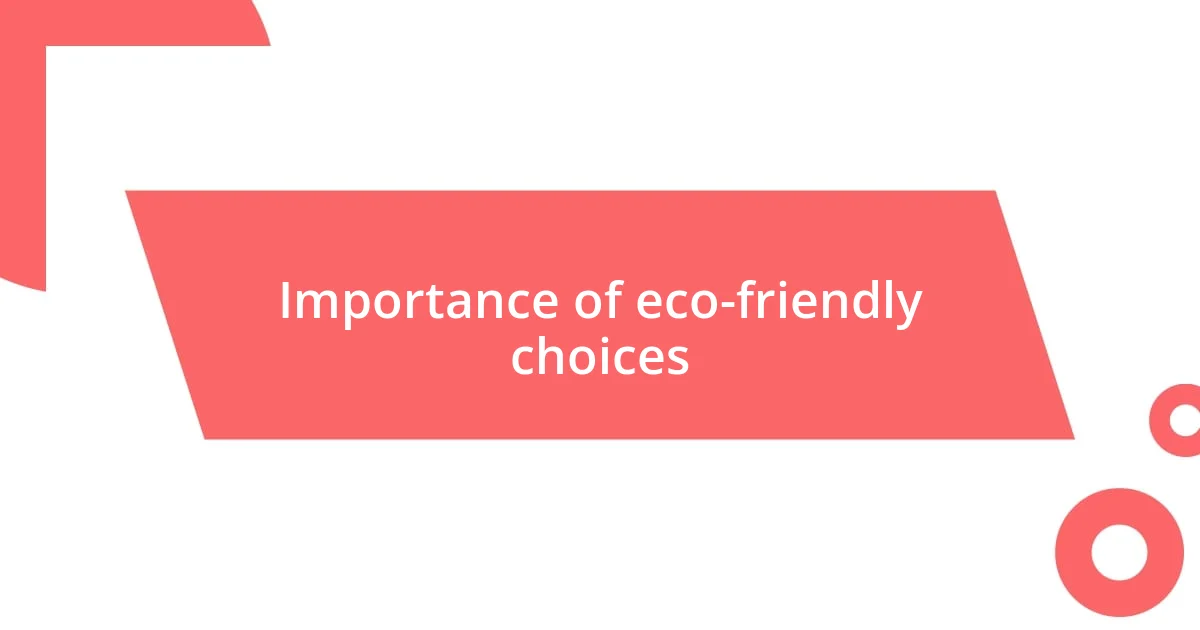
Importance of eco-friendly choices
Making eco-friendly choices is crucial not just for our environment, but also for our well-being. When I transitioned to using reusable shopping bags, it wasn’t just about reducing plastic waste; it reshaped my view on consumerism. Each time I walk into a store, I feel empowered knowing that my choices contribute to a more sustainable future. I’ve grown to appreciate how these little actions can lead us toward a healthier planet and cultivate a deeper sense of responsibility in our day-to-day lives.
Here are some key reasons why choosing eco-friendly products is essential:
- Reduction of Waste: Many eco-friendly products are designed to be biodegradable or reusable, significantly cutting down on landfill waste.
- Conservation of Resources: Sustainable materials often require fewer resources to produce, helping conserve our planet’s precious resources.
- Health Benefits: Natural ingredients in eco-friendly products mean fewer toxic chemicals in our homes, promoting a healthier living environment for us and our families.
- Support for Ethical Practices: Choosing eco-friendly means supporting companies that prioritize sustainability and ethical production methods.
- Long-term Savings: Investing in durable, high-quality eco-friendly products can save money over time, as they often last much longer than conventional options.
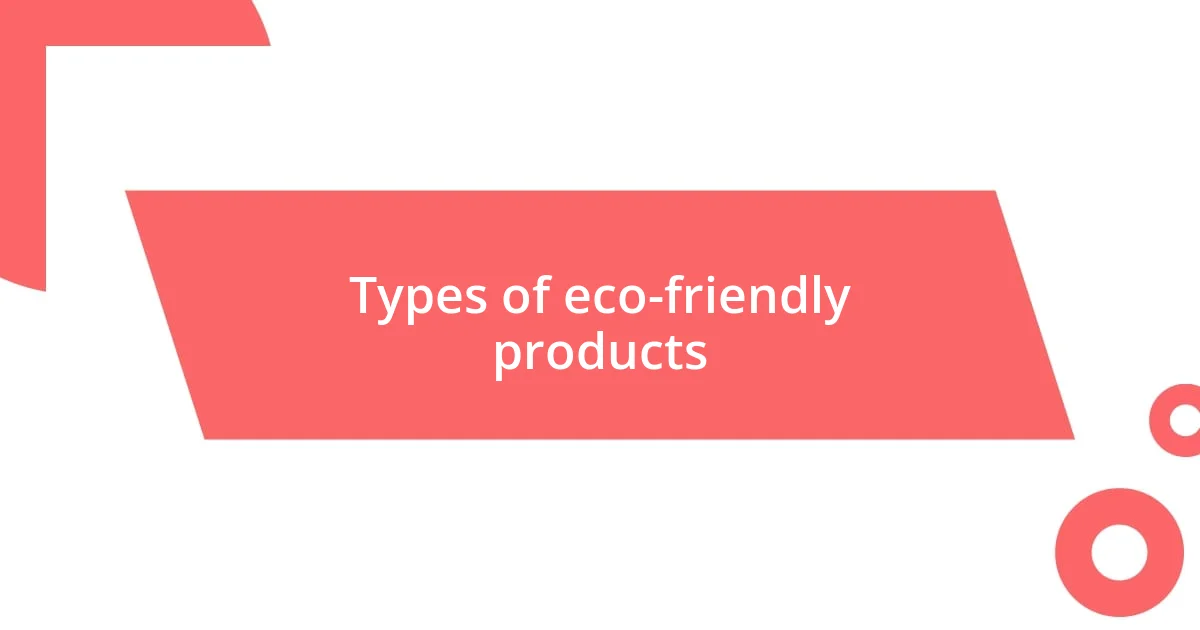
Types of eco-friendly products
When exploring the various types of eco-friendly products, a few categories stand out. For instance, biodegradable items, like compostable plates and utensils, break down naturally and reduce plastic waste. I vividly remember hosting a picnic and choosing biodegradable picnic ware; it felt great knowing that cleanup wouldn’t involve tossing plastic into the trash.
Another significant type is reusable products. Things like stainless steel straws or cloth shopping bags have become staples in my daily life. Initially, it was a challenge to remember to carry them around, but over time, it developed into a habit that I now cherish. Each time I decline a plastic straw, I feel that small victory for the planet, and it serves as a reminder of my commitment to sustainable living.
Lastly, there are eco-friendly personal care products, which include natural deodorants and organic skincare. Transitioning to these products has been eye-opening. I can still feel the relief when I switched to a natural shampoo, realizing it not only works better for my hair but is also gentler on the environment. This shift highlights how personal choices can align with broader ecological benefits.
| Type of Eco-Friendly Product | Description |
|---|---|
| Biodegradable Products | Items that decompose naturally, helping to reduce waste. |
| Reusable Products | Durable items meant for repeated use, decreasing reliance on single-use plastics. |
| Eco-Friendly Personal Care | Natural alternatives to conventional beauty products, enhancing personal health and reducing chemical exposure. |
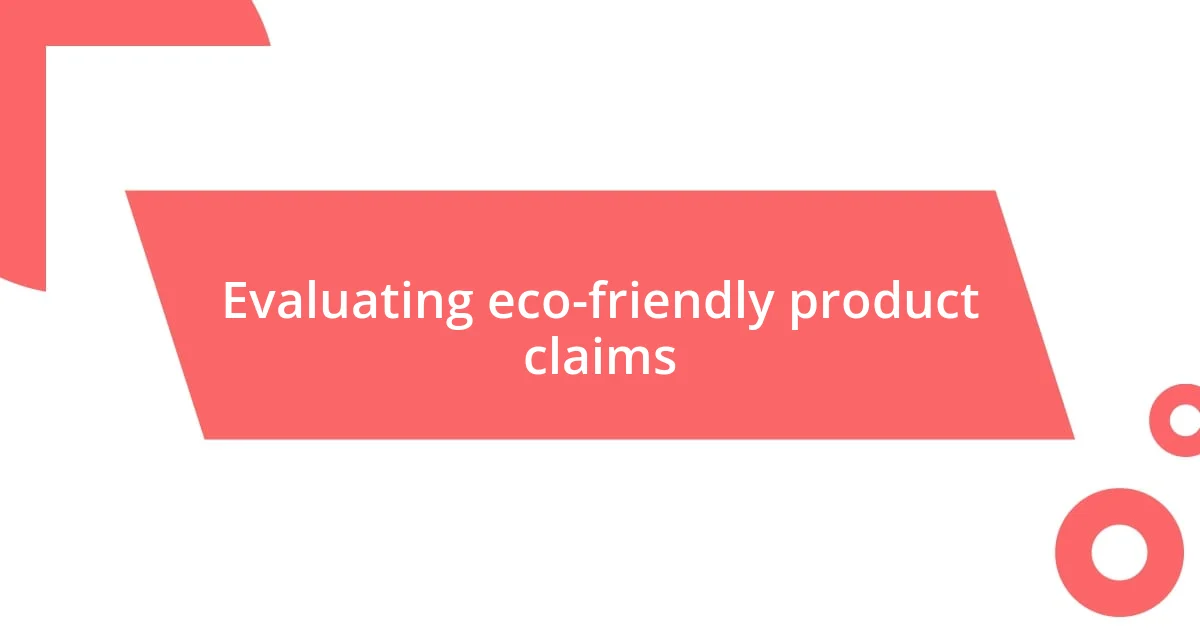
Evaluating eco-friendly product claims
Evaluating eco-friendly product claims can often feel like navigating a maze. I remember when I first started exploring eco-friendly options; I was overwhelmed by the sheer amount of labels and marketing jargon. Terms like “biodegradable,” “green,” and “natural” are tossed around so freely that it can be hard to discern what they truly mean. It’s crucial to dig deeper—does the product actually break down in a landfill, or does it just mean it’s less harmful than conventional options?
I once bought one of those trendy “eco-friendly” cleaning sprays, only to find out later that its ingredients weren’t as clean as I’d hoped. It taught me to not just take claims at face value. What I’ve learned is that researching the brand’s practices, checking certifications from recognized organizations, and reading customer reviews are essential steps. Have you ever felt that rush of excitement when you think you’ve found the perfect eco-friendly product, only to be let down later? Trust me; you’re not alone.
Now, looking into claims about health benefits can be equally tricky. I was initially drawn to eco-friendly personal care products because I wanted fewer toxins in my life. However, not every claim about being chemical-free truly means “safe.” I’ve become a firm believer in reading ingredient lists and, whenever possible, opting for products that disclose all their components clearly. Have you considered how much healthier your environment could be by just being a bit more inquisitive about the products you choose? For me, this quest for knowledge has not only enhanced my awareness but also made my eco-friendly journey feel much more fulfilling.
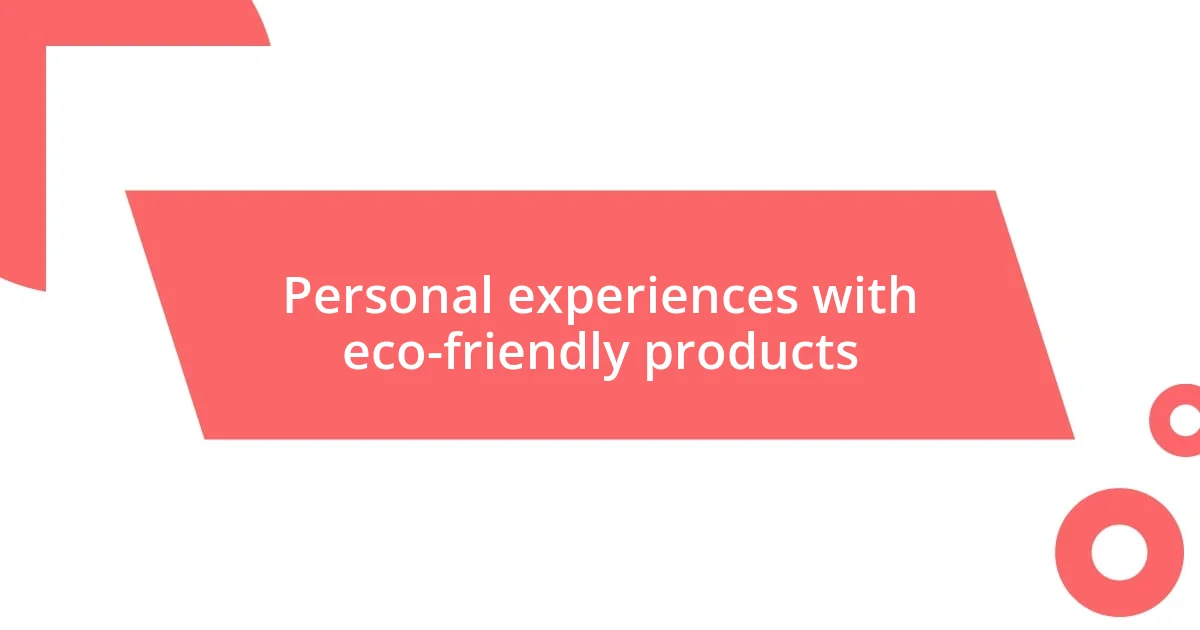
Personal experiences with eco-friendly products
I remember the first time I transformed my cleaning routine with eco-friendly products. After swapping out my usual all-purpose cleaner for a plant-based alternative, I was struck by how much better it smelled and how effective it was at cutting through grime. It made me wonder: why had I clung to those harsh chemicals for so long? The satisfaction of cleaning my home with something gentler not only improved my space but also lifted my spirits in a way I hadn’t anticipated.
Transitioning to eco-friendly personal care products has been a journey filled with both excitement and skepticism. I made the switch to a bamboo toothbrush, and initially, I missed the feel of plastic. However, I soon enjoyed the sleek design and the knowledge that it was better for the planet. It’s funny how these small choices can shift your mindset; every time I reach for that toothbrush, I feel a connection to something larger than myself. Have you ever noticed how one small change can ignite a spark of motivation to pursue even more sustainable habits?
My experience with eco-friendly fashion has been particularly enlightening. I remember buying my first clothing item made from recycled materials and feeling immense pride wearing it. Not only does it look good, but I love sharing the story behind it. It’s fascinating to think how our clothing choices can impact waste and resource consumption. Could shifting our wardrobe mentality lead us to a more sustainable lifestyle? Absolutely! Every time I wear that shirt, it reminds me that fashion can be eco-conscious, and it’s empowering to be part of that change.
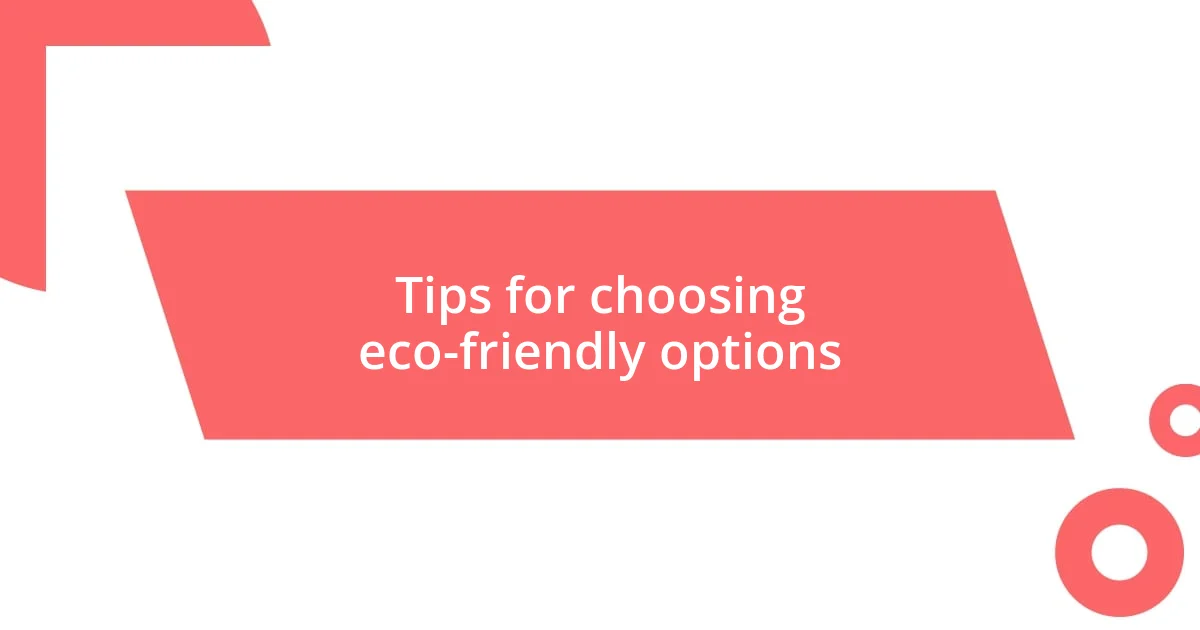
Tips for choosing eco-friendly options
When it comes to choosing eco-friendly options, I always prioritize products that have clear, trustworthy certifications. Discovering the USDA Organic or Fair Trade labels has been a game-changer for me. These labels tell me that the product meets specific environmental and ethical standards. Have you ever felt uncertain about whether a product was truly sustainable? Trust me, certifications can provide that much-needed reassurance.
I’ve also learned to pay close attention to the packaging. When I first started my journey, I often overlooked this detail, focusing solely on the product itself. But I now realize that even the container can tell a story about sustainability. I remember being excited about a moisturizer I found, only to later discover it came in plastic that wasn’t recyclable. Realizing that I was contributing to more waste was a wake-up call. Have you ever thought about how your choice of packaging affects the planet? Each small decision matters, and I now feel empowered to choose products that are packaged in biodegradable or recyclable materials.
Lastly, I can’t stress enough the importance of learning about local brands. Initially, I was drawn to well-known eco-friendly brands with buzzworthy marketing campaigns. However, I’ve found that local companies often produce equally sustainable options with a lower carbon footprint due to less transportation. I remember stumbling upon a local soap maker at a craft fair whose products were not only wrapped in recycled paper but also had delightful scents made from natural essential oils. How rewarding it felt to support local artisans while making conscious choices! Isn’t it incredible how a simple shift in focus can lead to enriching experiences?










